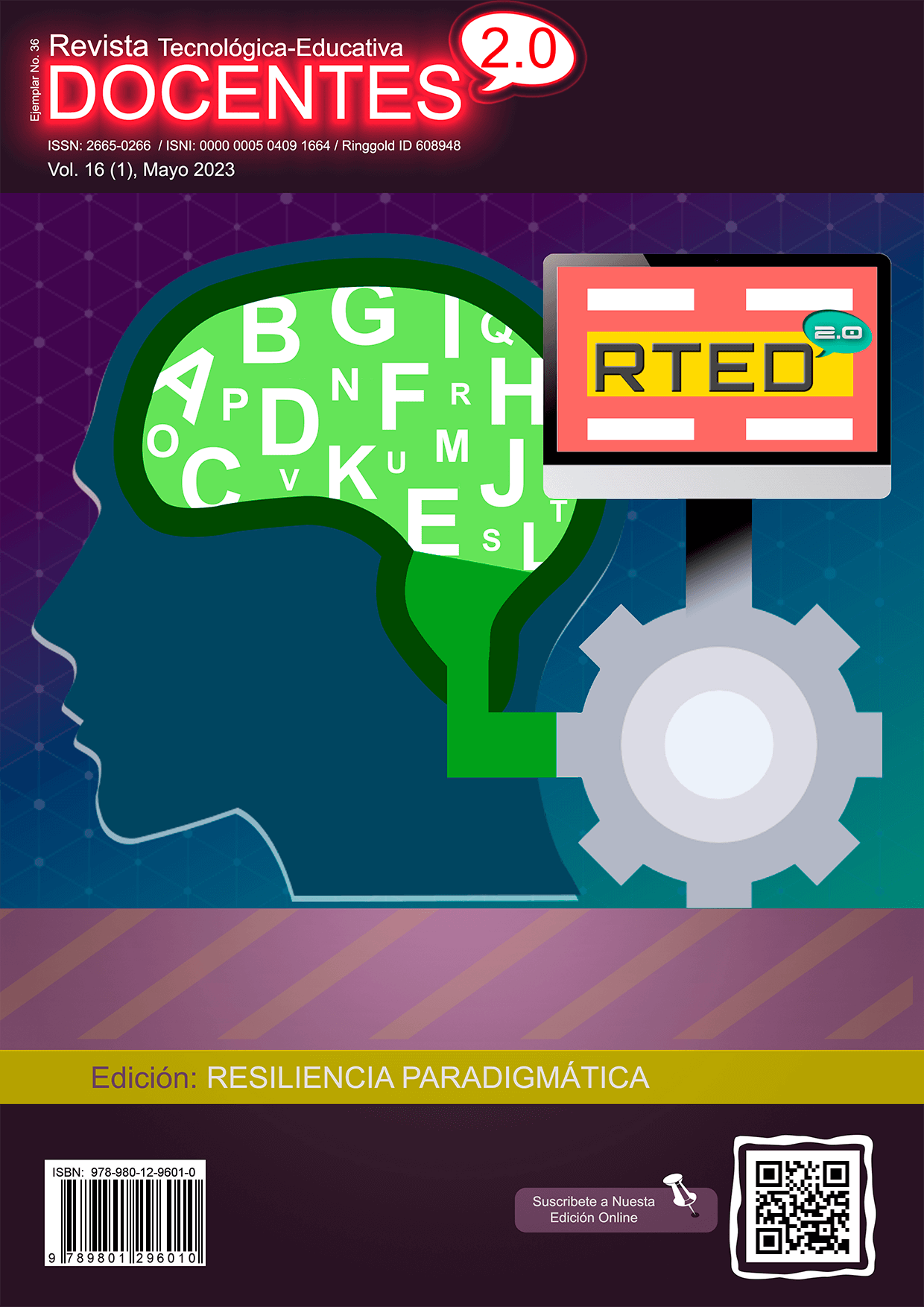Technological Design in Didactic Programming
 DOI:
https://doi.org/10.37843/rted.v16i2.313
DOI:
https://doi.org/10.37843/rted.v16i2.313
Main Article Content
Abstract
In recent years, the techno-pedagogical design has been strengthened as a support tool in the teaching-learning process at different academic levels; in the same way, it is known, promoted, and accepted by some educational institutions worldwide. The purpose of this essay was to emphasize the importance of didactic programming in classrooms supported by technology. The study was framed under the inductive method, in the humanist paradigm, with a qualitative approach of an interpretative type and topical narrative design. Given that, it is imperative to build enterprising, interactive, and collaborative classrooms which approve the reciprocal action of the student in his most active role with the activities, as well as the modification of the traditional role of the educator as an advisor. The work was constituted in two blocks of reflective analysis that arise from the combination of pedagogical knowledge of the content and active didactic methodologies such as cooperative learning, demonstration method, and gamification. To conclude, didactic programming has evolved due to the advancement of technology. However, at present, technology-supported learning and teaching are often carried out without explicit reference to students and teachers since the focus is on technology. Therefore, technology adoption through the current didactic programming has shown low expectations since most teachers have not received equipment or sufficient technological training to carry out a techno-pedagogical design.
Downloads
Metrics
Article Details

This work is licensed under a Creative Commons Attribution-NonCommercial-NoDerivatives 4.0 International License.
Those authors who have publications in our journal accept the following terms:
- When a work is accepted for publication, the author retains rights of reproduction, distribution of his/her article for exploitation in all countries of the world in the format provided by our magazine and any other magnetic medium, optical, and digital.
- Authors will retain their copyright and guarantee the journal the right first to publish their work, which will be simultaneously subject to the Creative Commons Acknowledgment License (Attribution-NonCommercial-NoDerivatives 4.0 International (CC BY-NC-ND 4.0)). That allows third parties to copy and redistribute the material in any medium or format, under the following conditions: Acknowledgment - You must properly acknowledge authorship, provide a link to the license, and indicate if any changes have been made. You may do so in any reasonable way, but not in a way that suggests you have the licensor's endorsement or receive it for your use. NonCommercial - You may not use the material for a commercial purpose. NoDerivatives - If you remix, transform, or build from the material, you cannot broadcast the modified material. There are no additional restrictions - You cannot apply legal terms or technological measures that legally restrict you from doing what the license allows.
- Authors may adopt other non-exclusive license agreements to distribute the published version of the work (e.g., deposit it in an institutional archive or publish it in a monographic volume) provided that the initial publication in this journal is indicated.
- Authors are allowed and recommended to disseminate their work through the Internet (e.g., in institutional telematic archives, repositories, libraries, or their website), producing exciting exchanges and increasing the published work's citations.
- Request of withdrawal an article has to be done in writing by the author to the Editor, becoming effective after a written response from the Editor. For this purpose, the author or authors will send correspondence via e-mail: [email protected].
- The author will not receive financial compensation for the publication of his work.
- All Docentes 2.0 Journal publications are under the Open Journal System (OJS) platform at: https://ojs.docentes20.com/.
References
Asad, M. M., Aftab, K., Sherwani, F., Churi, P., Moreno-Guerrero, A.J., & Pourshahian, B. (2021). Techno-Pedagogical Skills for 21st Century Digital Classrooms: An Extensive Literature Review, Education Research International, Article ID 8160084, 12 pages. https://doi.org/10.1155/2021/8160084 DOI: https://doi.org/10.1155/2021/8160084
Bocconi, S., Chioccariello, A., Dettori, G., Ferrari, A., & Engelhardt, K. (2016). Developing Computational Thinking in Compulsory Education, Implications for Policy and Practice; Publications Office of the European Union.
Fuentes-Cabrera, A., Parra-González, M.E., López-Belmonte, J., & Segura-Robles, A. (2020). Learning Mathematics with Emerging Methodologie. The Escape Room as a Case Study. Mathematics, 8. DOI: https://doi.org/10.3390/math8091586
Hashweh, M.Z. (2005). Teacher pedagogical constructions: a reconfiguration of pedagogical content knowledge. Teachers and Teaching, 11, 273–292. DOI: https://doi.org/10.1080/13450600500105502
Johnson, D.W., & Johnson, R.T. (1995). Cooperative Learning. School Improvement Programs. In A Handbook for Educational Leaders; Block, J.H., Everson, S.T., Guskey, H., Eds.; Scholastic Inc.; pp. 25–26.
Mayo, I. C., & Pino-Juste, M. (2011). Diseño y desarrollo del currículum. Alianza editorial. ISBN: 97-8842-0663982.
Mujica-Sequera, R. M. (2021). Clasificación de las Herramientas Digitales en la Tecnoeducación. Revista Tecnológica-Educativa Docentes 2.0, 12(1), 71–85. https://doi.org/10.37843/rted.v1i1.257 DOI: https://doi.org/10.37843/rted.v1i1.257
Papert, S., & Harel, I. (1991). Constructionism. Ablex Publishing Corporation.
Piaget, J. (1964). Part I: Cognitive development in children: Piaget development and learning. Journal of Research in Science Teaching, 2, 176-186. http://onlinelibrary.wiley.com/doi/10.1002/tea.3660020306/pdf DOI: https://doi.org/10.1002/tea.3660020306
Salmerón, H., Gutiérrez-Braojos, C., Rodríguez, S., & Salmerón, P. (2010). Influencia del aprendizaje cooperativo en el desarrollo de la competencia para aprender a aprender en la infancia [Influence of cooperative learning in the development of the learning how to learn competence in childhood]. Rev. Esp. Orientac. Psicopedag., 21, pp. 308–319 DOI: https://doi.org/10.5944/reop.vol.21.num.2.2010.11534
Shulman, L.S. (1986). Those who understand: knowledge growth in teaching. Educational Researcher, 15, 4–14. DOI: https://doi.org/10.3102/0013189X015002004
Tobón, S. (2008). La formación basada en competencias en la educación superior: el enfoque complejo. Universidad Autónoma de Guadalajara, 5.
Zamora, Á., & Ardura, D. (2014). ¿En qué medida utilizan los estudiantes de Física de Bachillerato sus propios errores para aprender? Una experiencia de autorregulación en el aula de secundaria [To what extent do high school physics students use their own mistakes to learn? An experience on self-regulation in a secondary school classroom]. Enseñanza Cienc. 32, pp. 253–268. DOI: https://doi.org/10.5565/rev/ensciencias.1067
Zichermann, G., & Cunningham, C. (2011). Gamification by Design: Implementing Game Mechanics in Web and Mobile Apps. CA O'Reilly Media.






